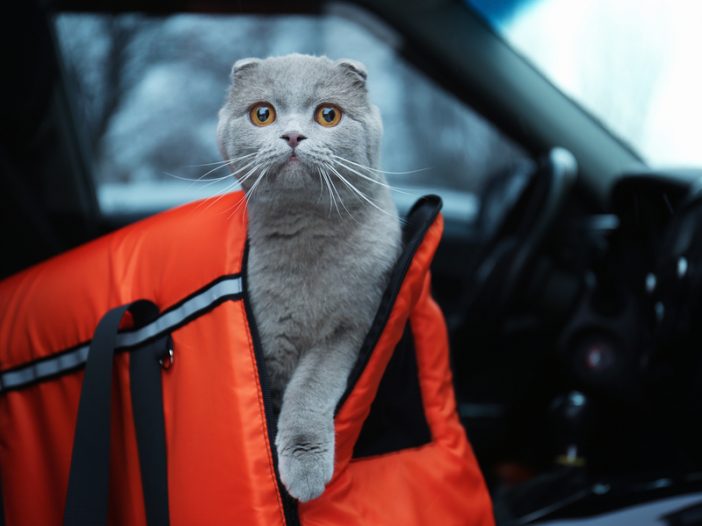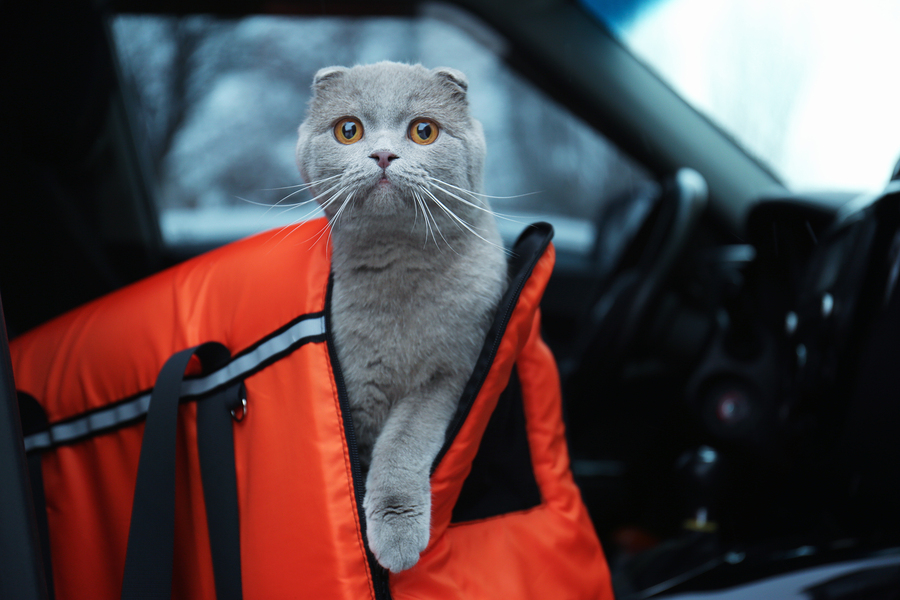
James was my heart kitty. He was like a little person. He had stress-induced asthma and I used to sing to him (“Sweet Baby James”) in the car – when we drove cross-country from California, where he was born in an old church, or when I had to take him to the emergency clinic in the middle of the night to get him on oxygen. He saw me through five moves, my vet school graduation, my bad-idea boyfriends and my marriage. He knew the ins and outs of my moods and never loved me any less for one second, even when I got a dog.

An Old, Loved Carrier
Through all of this, there were few constants other than love, his affinity for chewing around the edges of plastic shower curtains, and… the cat carriers. Green plastic, the kind that open at the top as well as the front, but the handles cut into your hand when the rubber grips wear off. They sat in the study at my Dad’s house in Maryland, the living room in my one-bedroom apartment in Ithaca, my townhouse in Syracuse, and in the “cat rooms” at our houses in Pennsylvania. No matter where we lived, there they were, with old hairy towels at the bottom in any room where my cats liked to hang out. They used them as beds, they played footsie through them, and they left snack crumbs in them. Sometimes, they had to go to the clinic in them, but by then the cats and the carriers were old friends.
In the winter of 2015, James went into heart failure. He spent four days at the ER and came home to me for one night, held together by a whole bunch of medication and my desperate hope. I got up the next morning and found him gasping for air, unable to eat, looking at me with liquid eyes that asked for peace. He was in his carrier, sitting on his old hairy towel. I closed the door, put on my coat, and sang his song to him all the way back to the ER for the last time.
We hear it all the time: we live in the age of instant gratification. We have access to more information than we could ever hope to need about any subject we could possibly think up. We have drive-through coffee and order-ahead food apps and movie streaming and digital books and online bill-pay. We can renew our auto registration or pay the mortgage on the day they’re due. Somehow, even though we can get so many things done instantly, we have less time than ever before. And this makes the truth hard to swallow: in this era where you can have no cash on you and use an app to find a ride from a stranger in five minutes or less on Saturday night in a major city, some of the best things in life still take time – sometimes a LOT of time.
I schlepped those cat carriers across the country and up and down the East Coast, and I rarely cleaned them out because my cats loved the smelly old towels and were suspicious of new ones. They looked terrible and they weren’t even comfortable to carry. But knowing I didn’t have to stuff my terrified, gravely ill, once-in-a-lifetime kitty in a box he hated on the last day of his life? That was priceless. It literally took years and it was worth it.
The Long Game in Life
Bill Dellinger said, “Good things come slow, especially in distance running.” He might as well have said, “… in crate training,” “… in medicine,” or “… in relationships.” I heard a podcast a while back where two running coaches were discussing what kinds of clients they like to take on. They said the biggest thing for them that determined whether a runner would be successful was whether the person was looking for rapid progress or in it for the long game. A runner who entered the program knowing they would be working hard for 18 months or more before really expecting to try to achieve a big goal was already demonstrating the keys to most great things in life – dedication and patience.
But we don’t admit this enough. When we start a new job, we feel like we have to gel with the team immediately. We might feel lonely because no one really knows who we are, and it feels like they never will. Even if we left a job we knew wasn’t the right fit anymore, we think nostalgically about our former coworkers who really “got us,” forgetting that they had the benefit of many hours spent together in the trenches.
Clients Forget This Too
When we meet a client, there’s instant pressure to show them we are the best they’ve ever met and to convince them we know the right way for them to spend their money and emotional energy to keep their pet healthy. When we take on a project such as implementing the Fear Free initiative at our practice or trying to get clients and staff to embrace our message and culture, we are looking for immediate improvements in patient care, client perception and education, and staff happiness. These goals simply aren’t realistic, and yet we are surprised every day when we appear to fail.
I talk to clients every day about getting cats used to carriers, about conditioning their dogs to love the car, about the lifelong struggle that is allergic skin disease, and about planning ahead for things like flea season, emergency surgery, chronic disease, and possible weight gain after spay or neuter. I wonder if I often avoid direct references to the passage of time. People don’t seem to want to hear about that.
They want to know whether they will see relief for their pet in 24 to 48 hours, not hear that they will need to do a 12 week food trial with an elimination diet to try to avoid years of unnecessary medication. They want a guarantee of excellent behavior after one session with a trainer, not a link to videos about how to train your dog to allow his nails to be trimmed using positive reinforcement and about a metric ton of patience. And we can’t blame them at all, because this is what we want too. We just know better when it comes to our area of expertise.
Next time you feel the urge to roll your eyes as a client asks, “Why does her ear infection keep coming back? We can’t keep spending all this money for you not to fix it,” remember that client probably has 20 apps on her phone that let her get groceries ordered, bills paid, and trips scheduled faster than it takes you to figure out how to put a cat carrier back together. Maybe, without condescension, find gentle words to remind her that anything really meaningful – like a pain-free, comfortable life for the Cockapoo whom she loves like a child – is worth the time and effort it takes to get it done right.
In the one-click age of Amazon Prime, sometimes the most revolutionary thing we can do is play the long game.
The views and opinions expressed in this article are those of the author and do not necessarily reflect the position of the DrAndyRoark.com editorial team.
 About the Author
About the Author
Dr. Katie Berlin is a small animal general practitioner in Mechanicsburg, PA. She is also a reader, a rider, a runner, a lifter, a teacher, and an art lover. She graduated from Williams College in 2000 with a degree in Art History and worked in art museums before going back to school and earning her DVM from Cornell in 2009. She is an avid supporter of Fear Free practice and the battle against compassion fatigue in the veterinary profession.